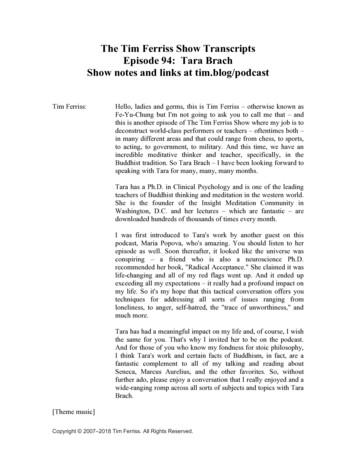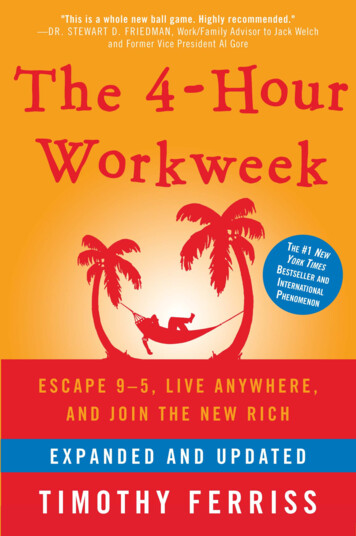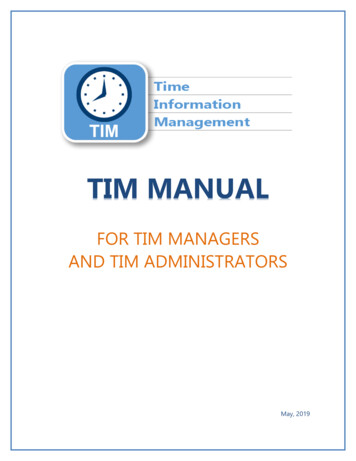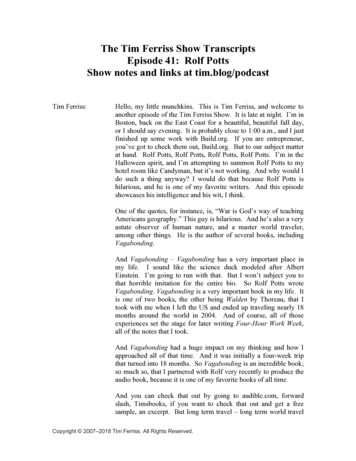
Transcription
The Tim Ferriss Show TranscriptsEpisode 94: Tara BrachShow notes and links at tim.blog/podcastTim Ferriss:Hello, ladies and germs, this is Tim Ferriss – otherwise known asFe-Yu-Chung but I'm not going to ask you to call me that – andthis is another episode of The Tim Ferriss Show where my job is todeconstruct world-class performers or teachers – oftentimes both –in many different areas and that could range from chess, to sports,to acting, to government, to military. And this time, we have anincredible meditative thinker and teacher, specifically, in theBuddhist tradition. So Tara Brach – I have been looking forward tospeaking with Tara for many, many, many months.Tara has a Ph.D. in Clinical Psychology and is one of the leadingteachers of Buddhist thinking and meditation in the western world.She is the founder of the Insight Meditation Community inWashington, D.C. and her lectures – which are fantastic – aredownloaded hundreds of thousands of times every month.I was first introduced to Tara's work by another guest on thispodcast, Maria Popova, who's amazing. You should listen to herepisode as well. Soon thereafter, it looked like the universe wasconspiring – a friend who is also a neuroscience Ph.D.recommended her book, "Radical Acceptance." She claimed it waslife-changing and all of my red flags went up. And it ended upexceeding all my expectations – it really had a profound impact onmy life. So it's my hope that this tactical conversation offers youtechniques for addressing all sorts of issues ranging fromloneliness, to anger, self-hatred, the "trace of unworthiness," andmuch more.Tara has had a meaningful impact on my life and, of course, I wishthe same for you. That's why I invited her to be on the podcast.And for those of you who know my fondness for stoic philosophy,I think Tara's work and certain facts of Buddhism, in fact, are afantastic complement to all of my talking and reading aboutSeneca, Marcus Aurelius, and the other favorites. So, withoutfurther ado, please enjoy a conversation that I really enjoyed and awide-ranging romp across all sorts of subjects and topics with TaraBrach.[Theme music]Copyright 2007–2018 Tim Ferriss. All Rights Reserved.
Tara, thanks for coming to the show.Tara Brach:I'm delighted to be with you, Tim.Tim Ferriss:And I am having a bit of déjà vu all over again – as one very wiseman once said – because I've heard so many of your guidedmeditations that it seems unreal to be talking to you live.Do you get that a lot? Do you have people come up to you andhave to do a double take with your voice or people recognize youin restaurants because they've heard your guided meditations?Tara Brach:Yeah, that and they'll say, "Oh, you look so much littler than Ithought." And then I'll start speaking and they'll go into sort of ahypnotic trance or something.Tim Ferriss:I've been introduced to you through many different people and,eventually – almost with the same way that meditation knocked onmy door until I finally answered – Maria Popova, who runs a sitecalled BrainPickings and is just one of my favorite people, broughtyou up on this podcast, in fact, and then a number of my otherfriends – I have a friend named Olivia who also brought you up –and it just got to the point where, specifically, your guidedmeditations and "Radical Acceptance" had been introduced intomy life – or my slipstream, my consciousness – so many differentways I felt like perhaps it was time for me to sit down and take alook at things.And, so first off, I wanted to just thank you for the work that youdo because it's had a very positive impact on my life and, based onthe response of my audience, on many people who are likelylistening to this interview. So, first off, I just wanted to thank youfor that.Tara Brach:Thank you. I appreciate hearing it and it's very mutual but I won'tgo there right this moment. But thank you for how much whatyou're doing ripples out. Yeah.Tim Ferriss:I'm just, every day, slogging along in my own way. Although ifpeople could see, sometimes I think, how the sausage is made I– not so much worry – but part of the reason I usually declinejournalists who want to follow me around for three to five days,I'm like, "You might be envisioning something that is verydifferent from my reality. I think you see me snowboarding in theAlps and then taking some type of zip line into a bathtub where I'mreciting poetry or whatever the image might be."Copyright 2007–2018 Tim Ferriss. All Rights Reserved.
I have no idea what the image is. I'm like, "Most of the time, itlooks like I'm just sitting there."Tara Brach:I know. It can be awful ordinary from the inside out – orextraordinary. Both.Tim Ferriss:So I was hoping we might start where things began and to rewindthe clock a little bit and just give people a retrospective of how yougot to the point where you're teaching Buddhist meditation, andmindfulness, and so on. And I have a little bit of the backgroundfrom "Radical Acceptance" and having read that but, for thosepeople who are unfamiliar with your work, maybe you could givejust a brief overview of your background. I think that would be ahelpful place to start.Tara Brach:Sure. Well, if I go back more to the teens, I was completely Iremember when I first went to a class on comparative religion andgot a whole mess of them introduced and I decided that Buddhismwas at the very bottom of my list because it's just like, "Whywould I want to give up desire?" I was a total hedonist and I lovedmy desires whether it was nature and athletics, or drugs, or sex, orparties, or It's like, "Why give up desire?" and it was aboutanother five years until I got it that that wasn't the message. Itwasn't give up desire. It was to not have desire be a tyrant overyour life – not be possessed. So I was just a thrill-seeking and alsoType-A kind of teen – very hard-working and hard-playing.Tim Ferriss:And where was this?Tara Brach:I grew up in Montclair, New Jersey which we all called "The Hubof the Universe" because it seemed like the center of everything.And then I went into college thinking I was going to be a lawyerand, when I graduated, I moved right into an ashram so somethinghappened in there.Tim Ferriss:That's quite an abrupt transition.[Crosstalk]Tara Brach:Something happened.Tim Ferriss:I'm so curious. What triggered that? Was it a conversation, aparticular movie or book? How did you go from preparing to be alawyer to going to an ashram?Copyright 2007–2018 Tim Ferriss. All Rights Reserved.
Tara Brach:Well, there are a number of influences. Part of it's the times – Iwent to college and it was social activism. I was very anti-war,very involved with left-wing politics. And the combo of that withpsychadelics combined with the whole east coming to the west andintroducing yoga. I began to do yoga my junior or senior year incollege.My reality shifted, Tim. I've always had an interest in learning anacademics to some degree but it was like I was passionate aboutdiscovering what is the nature of the universe – what is reality?And I've always been fascinated with the psyche – how do theseminds work? So I knew I just had to give myself to that.So when I graduated, I went to what's called a summer solsticegathering. It was a big yoga, meditation gathering and there wasjust this experience that there was a mystery that was so muchbigger than the world that I normally lived it – that that was thething to commit myself to. So I really, literally, went from collegeright into an ashram community. And ashram, for those that arelistening and don't know, it's a spiritual community where wepractice yoga and meditation.We'd get up at 3:30 in the morning and start with a cold shower –that was the beginning of the day was getting into a cold shower –and then doing a lot of very vigorous yoga, and chanting, andmeditation. And after a few hours, I'd enter the day just feelingabsolutely ablaze with both energy and also very, very peacefuland happy. And then, during the day, because I carried all myType-A stuff into ashram listening, I was a pretty driven yogi.Tim Ferriss:You were a varsity player.Tara Brach:Yeah. You got it. It's amazing. We do that. I've seen pretty mucheveryone I know get into spiritual life or spiritual practice butbring all their normal egoic, neurotic stuff into it.So I did that and I remember I had –[Crosstalk]Tim Ferriss:Oh, I'm sorry.Tara Brach:And we all have different ways of doing it. For me, I had this ideathat if I worked really hard at it, I could get enlightened in six orseven years. And I have no idea where I got that number but thatCopyright 2007–2018 Tim Ferriss. All Rights Reserved.
was my I just figured I'd really throw myself in and So Iwould sometimes go to different teachers and say, "Well, what elsecan I do?" because I was going at it. As a group, we would get upat 3:30 in the morning but I'd often get up at 2:30 so I could get alittle extra in. And I don't say this by way of pride – I've learnedsince then. So I'd ask this question, "What else can I do?" and to aT, the response would be, "Just relax."And then I'd go, "Oh, just relax," and that would become my nextpractice, "I'm going to do this now."Tim Ferriss:"I'm going to wake up 30 minutes earlier to relax."Tara Brach:Exactly right. It's like race, race, race to get there and wait.Anyway, those were my earliest years in the ashram. I was prettydriven and trying really hard to purify and become a better person.And I got drawn both because I intuited this mystery, I intuited alove that really was possible to inhabit and express and anawareness that was very vast. And I also was drawn because Iwanted to become a better person and I spent a lot of my earlieryears feeling like I wasn't enough – I needed to be better. So it wasalso a self-improvement project at the same time.Tim Ferriss:How did you feel you weren't good enough? Or what were thethings you hoped to improve?Tara Brach:Well –[Crosstalk]Tim Ferriss:Because I'm a head case about this stuff so this is not me talkingdown in any way. I struggle with a lot of these, I think, issues soI'm asking for myself as much as anyone else.Tara Brach:Yeah. Well, I've come to call it the "trance of unworthiness," inretrospect, and I like talking about it becusae I feel like mosteveryone I know It feels like a pervasive suffering in our culturethat we have this sense that we should be better. There's a cartoon Ilove with this dog on a psychiatrist couch and he's saying, "It'salways good dog this and good dog that, but is it ever great dog?"Tim Ferriss:Sounds like a New Yorker cartoon.Tara Brach:It does, doesn't it? Yeah. So I'd say, for myself, I think the biggestareas of feeling unworthy or not good enough was a sense of beingselfish or self-centered like, in some way, my own needs comeCopyright 2007–2018 Tim Ferriss. All Rights Reserved.
first. I remember, also, in high school and the first years of collegebeing out of control with my eating and feeling overweight andbeing really, really ashamed of that so I just felt that somethingwas wrong with me there. And that I just, in some way, was fallingshort – whether it was as a friend or a daughter, whatever, and Ihad a lot of insecurity and I was just very driven to seek approval.And so I could see the different ways that I played out but it wasdefinitely the core sense of not good enough.And that really became the seed of writing "Radical Acceptance,"was both through my own experience of not enough and then, as apsychologist and then as a spiritual teacher, just seeing the tormentof how many people are not able to enjoy their moments because,in some way, there's a sense of something's wrong.I'll share with you one story that really hit me – and I think it's in"Radical Acceptance" – of a woman who was in a coma and herdaughter was by her – and her daughter told me this story – andshe was dying and, at one point, her eyes bolted open and shelooked her daughter in the eye and said, "All my life, I thoughtsomething was wrong with me." And then she closed her eyes andthat was it.That was her last words. She died after that. And for my friend –for the woman – it was a parting gift because she realized just howsad it is to spend so many moments at war with ourselves. And partof when I teach about the trance of unworthiness we can start tosee how, if we're really not trusting ourselves – if we're filled withself-doubt – it's really hard to feel intimate with other people.There's always the fact that –[Crosstalk]Tim Ferriss:Totally agree.Tara Brach:Yeah. It's like they'll find out. It's like if I'm right now talking toyou and I feel like there's this core deficiency, it means I won't beable to be spontaneous or respond with tenderness. It's like there'salways a defensiveness.Anyway, that's a long way around saying that that became veryclear to me – at the end of college and the beginning of living in anashram – that I really wanted to In some ways, I needed tobefriend myself. That became a very clear thing. It wasn’t just apsychological thing – it was very much a part of spiritualawakening that I needed to really befriend this life.Copyright 2007–2018 Tim Ferriss. All Rights Reserved.
Tim Ferriss:And when you were having this ashram experience, when didthings change? When did you leave the ashram?Tara Brach:The ashram, the strength and the positive aspects, were that itmade it very easy to have a very regular, strong practice. And thenice thing about having a group of people – and I reallyrecommend this to all of us to periodically be able to practice withother people and exchange what's going on – that sense ofcommunity can keep on nourishing and enlivening what's going onin terms of awakening.And the ashram had a lot of rigidity to it, Tim. I joined when I was21 and I came from this very liberal background. I was veryindependent and yet I joined something that had quite a hierarchy.It was very patriarchal. It was really very different from what Iwould have thought for myself. Gradually, those qualities of therigidity made it so I needed to continue on the spiritual path but notinside the ashram environment. I stayed for ten years and I had anarranged marriage. This is something that's not so typical in theWest. I had all the longing to fall in love, and prince in shiningarmor, and get married and, instead, I was assigned my husbandand I don't know if I should speed over that one or not.Tim Ferriss:You know, I might come back to that but you can please continueand then we might come back to that.Tara Brach:Okay. So I went along with a lot of stuff because, again, I washaving very intense altered states of experience that were verylovely. I learned to concentrate my mind and I had a lot ofdevotional experiences and so on. But the structure and theauthoritarianism of the community got to me so I left after tenyears. And then right after leaving, got pregnant and had my son,Norian.Tim Ferriss:And, if you wouldn't mind, there's one particular story about theashram This being called out –[Crosstalk]Tara Brach:Oh, yeah.[Crosstalk]Copyright 2007–2018 Tim Ferriss. All Rights Reserved.
Tim Ferriss:– group setting that I think It really struck me as a turning point,perhaps, or an important event at the very least. If you wouldn'tmind describing that, I think that would add some context, as well.Tara Brach:Sure. Yeah, I had been trying to get pregnant and really eager tohave a child. And I finally got pregnant and I went to a gathering –we would gather for about a month in the mountains – and Iremember it was very, very hot and it was very rigorous activity atour gatherings and I miscarried. And so I wrote a note to thespiritual leader of the community and basically said, "You mightwant to warn some people that, if you're pregnant and you're in thiskind of heat, it might not be a good idea."And I think that must have made him feel like I was saying, "Well,something about your teachings caused me to miscarry," – which,of course, wasn't what I was saying. But I was in a group of severalhundred people when he had me stand up and he said, "You'retrying to blame your miscarriage on such and such. You miscarriedbecause of your ego." And it was very crude and it was abusive – itwas an abusive behavior – here I was two days after a miscarriage– to have me, in that vulnerable of place, berated in that way. AndI'm glad you brought it up because I'd already had a lot ofmisgivings about ashram living but his behavior made it utterlyclear to me that I couldn't be part of something where the leaderwould treat people in an abusive way.And, interestingly, I have had no abuse or trauma of any real sortin my history. I think if I had already been an abused person andI'd already had trauma in my nervous system, that it would havebeen much more difficult for me to process that experience.It was hours after it, I remember going into a little chapel andcrying deeply – the humiliation of it, the pain of it, the hurt of it,the betrayal like, "How could somebody I'd trusted do that?" andthen I got to a place where it became very clear to me that either Iwas going to, in some way, believe that he knew something anduse it against myself or I was going to absolutely get behind myselfin the sense of really dedicate to embracing myself – not to buyinto some badness.Because it could have easily played into the trance ofunworthiness.Tim Ferriss:Oh, definitely.Copyright 2007–2018 Tim Ferriss. All Rights Reserved.
Tara Brach:It could have been the killer – could have been the nail to thecoffin. But what it made to clear to me was that it was intrinsic tothe spiritual path to trust and embrace the life that's here. And thatdoesn't mean, Tim, that I felt that I was ego-free and that I didn'tmake mistakes – I'm very, very aware of all my imperfections. Itmore meant that, on some fundamental level, I was going to trustmy goodness. And so it was a turning point because it was afterthat betrayal that I chose to I really committed myself toaccepting myself as I was.And, since then, I ran into this quote from Carl Rogers who says,"It wasn't until I accepted myself just as I was that I was free tochange."Tim Ferriss:Yeah, this is So I'm glad you brought that up. I was actuallygoing to bring up that exact quote –[Crosstalk]Tara Brach:Oh, really?[Crosstalk]Tim Ferriss:– later in our conversation and we'll get to that – just because Ifound it very challenging and I've talked to many friends aboutthis. The balancing of acceptance versus proactivity – oracceptance versus being proactive. And we'll come back to thatbecause I know this is something that you've spoken about before.But the ashram, then, at that point, is a closed chapter of sorts. Soyou decide to do what many people, perhaps, would not have donebecause of their background or circumstances – which is really sadand you see this a lot in closed communities.But you took the path trying to accept yourself as opposed toaccept this negative version of yourself that had been reinforced bythis leader. At that point, where did you go with your studyingand/or your teaching?Tara Brach:I had been doing a lot of teaching while I was in the ashram –yoga, meditation. And my meditation started shifting and I gotvery drawn to Buddhist meditation which, interestingly If youthink of a lot of the yoga meditation as very much of a training andconcentration – and I suspect we'll get more into the different kindsof meditation as we speak – but it can really allow you to quiet themind and settle the mind and have access to experiences of a lot ofpeace.Copyright 2007–2018 Tim Ferriss. All Rights Reserved.
It can be profoundly pleasurable – and I loved that – but what itdidn't teach me was mindfulness which was really how to open upinto the present moment with a very profound quality of justsimple acceptance and presence to really notice what's going onright here. So I got drawn to Buddhism because that capacity formindful presence became more and more what drew me. So, after Ileft the ashram, I started reading and then going to retreats thatwere Buddhist meditation retreats. And I also had a child so I wasjuggling a few different worlds there but they came together okay.Tim Ferriss:And – since I promised to come back to it – arranged marriage, I'dlike to talk about this because – and I want to hear your thoughtson a couple of things – I've had a couple of conversations, halfjokingly, not totally jokingly, with friends who are, say, Indianwho have friends who've had arranged marriages. And some ofthese friends live in, say, New York City and they have thisparadox of choice conundrum where whoever they're dating –however smart, or attractive, kind, and so on they might be – theyare passing so many people on the street that they worry might bejust a little more attractive, a little more this, a little more that thatthey hop from one person to the next, to the next, to the next inrelationships.And, if I have a few drinks with them, sometimes they'll joke, "Itwould be a lot easier if I just had an arranged marriage because itwould take the decision making out of it on some level or perhapsmy parents could say not, 'This is the one person,' but, 'Here are thefive people you have to choose from.They're all really great people. Take your pick.'" And I'd just loveto hear how your arranged marriage was arranged. What were thecriteria? How were you two paired? And just your general thoughtson that entire experience?Tara Brach:Yeah, so maybe I'll – just to make a broader comment – that, forsome people from some traditions, it may well be that, given ahandful of people, that there may be somebody in that handful thatit really does work better for them and so this is not a judgementthat, culturally, this is a bad ritual. And, in this particular case, ithappened, I'd say a good number of times, maybe three-quarters ofthe marriages of the – we were all in our 20s when we first joinedthe ashram – were arranged by the head of the whole organizationand so mine was.Copyright 2007–2018 Tim Ferriss. All Rights Reserved.
And it was not done by any criteria that any of us could ever thinkof. It was very much that there was a man who lived in Canada andneeded his green card – that's what it was. And he was part of ourlarger community and they wanted him to be able to move into thecountry and get a green card and so they were looking forsomebody to match him with. And they knew I was single and theymade the arrangement for me not only to marry him but I had toleave where I was living – which was Boston – and come down toWashington. So it seemed, in my mind, to be absolutely this crazy,groundless pairing. It was just so far from what I had imagined formyself. And when I met him, he was a perfectly nice person butvery, very far from anybody I would have naturally, in my ownchoosing, have picked as a mate.So it was really, really rough. I was very upset by it. I pleaded notto have to do it. And, ultimately, it was my sense that, "Well, to bededicated to this path, means to go along with this." That wassomehow or other how my mind construed it – that I needed tosurrender my wants and just do it. And I could say right now, inmy current state of mind, astonished that I would have viewed itthat way because, as I say, I came out of pretty independentthinking people but that's what happened.And I married him and it turned out he was a wonderful, wonderfulhuman and he continues to be a dear friend and brother.He really is. We're very much We had a child together. Eventhough we divorced, we co-parented and we're good friends. And Ithink, Tim, that part of it is, because we didn't fall in love in aromantic way, when we decided to divorce, it wasn't the kind ofpainful tearing apart that brings up so much anger and senses ofbetrayal and so on. We were able to move on together.Tim Ferriss:This is very interesting. Yeah, you didn't have the enmeshing – Idon't know if that's the right word – but you didn't have a lot of thecomponents that create the complexity. And, I suppose one couldsay, the irrational anger and exaggerated anger directed at the otherperson just didn't exist.Tara Brach:Exactly. The more attachment there is, when we come apart, themore pain and feeling of vengefulness and everything flies up. So,no, it didn't have that.Tim Ferriss:I'd love to talk about meditation and mindfulness and we'll get tothat looking at the different types of meditation. But I'd love to askyou a couple questions that are just on my mind right now. So youCopyright 2007–2018 Tim Ferriss. All Rights Reserved.
mentioned enjoying the desires – the sex, the drugs, the this, thethat, which all sounds pretty fun, quite frankly – is it possible to bea mindful hedonist? And, if so, is that a bad thing?Tara Brach:A mindful hedonist? That should be my next book. I like it. I thinkit's possible to take tremendous pleasure in this world. In fact, oneteacher says, "Why fixate your desire on one thing? Why not justdesire it all?" and the more we're just in that receptivity wherethere's just an amazing appreciation for the simplest things – foreverything.Actually, there's a lot of freedom in that because there's not a lot ofclenching, and holding on, and having to control. Where the ideaof mindful hedonism could fall on its face is if we become attachedto the particular cruets of hedonism being a certain way – so if webecome attached to always having a certain food and then we endup getting addicted, or if we get attached to a certain chemicalsubstance and then it becomes harmful for our body, or we takehedonistic pleasure in being with one person sexually but then itturns out that it doesn't work out with that person. So if you seewhat I mean, when there's attachment and it's a tight holding, itactually causes suffering.Tim Ferriss:Totally agreed and I think that I have a friend who uses hedonisticas this He says it with this bitter cutting edge to his voice. He's avery close friend – I won't name him. But I think it's got a bad rap.Not to say that everyone should aspire to be hedonist but I thinkthat there's also, from my own experience at least and just lookingat modern technologically culture, there appears to be a disconnectwhere a lot of human beings do not know how to enjoy sensualpleasures – and by that I don't mean purely sex. They don't feel athome in their own bodies. They don't walk around barefoot. Theydon't have these types of sensory experiences that can be so rich.And I feel like the baby's getting thrown out with the bathwater alot and I'd be curious to hear how you might recommend someoneexperience pleasures without developing a harmful attachment.So, for instance, before we started recording, I was chatting withyou a little bit about fasting. And I've been experimenting withfasting, partially just to prove to myself that I am self-sufficientand can survive fasting. It's been a very empowering experiencefor me. And similarly, I did an experiment with my audience a fewmonths ago called "NOBNOM" – which I got a lot of grief for –but it meant, "No booze, no masturbation" for 30 days. And wehad about 10,000 people do this experiment. It was veryempowering for everyone involved – even those who didn't makeCopyright 2007–2018 Tim Ferriss. All Rights Reserved.
it the full 30 days. But aside from these intermittent periods ofabstinence, these experiments, are there other ways or practicesthat help someone not develop attachment to – I suppose anything– but certain pleasures that certainly would fall in that category?Tara Brach:Yeah, it's a wonderful question because, really, if we look at ourlives, where there's suffering – if we're not happy and if we're notat home – it's really because of the sense of, "I want thingsdifferent. I want more. There's not enough here," and that'sattachment. It's like, "I have to have more. I have to have feeling."And so my experience is that the more we actually are in themoment and in the senses – like right here, right now – the morewe decondition grasping because grasping comes like you havesomething and then you have the idea that you need to have moreto be happy.But if you actually let go of the idea and just experience – directlycontact – the pleasure in the moment and just notice that and thenif there's this arising of a sense of wanting more, you just noticethat and you come back right to your body again. It's staying in themoment that actually interrupts the chain reaction that leads tograsping onto things. But that takes practice, Tim. It's like, formost people, as soon as we have the first few spoons of ice cream,it's like we just spoon it in and we don't taste until, at the end,there's something lingering and then we have to have more andwe're already leaning into the future. So to stay with each bite,there's actually a fulfillment in it and we don't go down that trackof having to have.Tim Ferriss:Right. And I'm glad you mentioned the eating. My girlfriend –who, as I mentioned before we got started, is a massive fan ofyours – has done quite a bit with women with eating disorders andI know you've spent a lot of time thinking about this. But she's hada lot of success with her past clients simply saying, "You'reallowed to eat whatever you want to eat but you have to reallyenjoy it and focus on the experience of eating that food." And justby, not forcing, but facilitating that mindfulness, a lot of thosepeople didn't go on autopilot and consume the 12 scoops instead ofone, for instance.Tara Brach:Exactly. Yeah.Tim Ferriss:She was trying to stop me from drinking wine last night and shesaid, "You're allowed to have another glass but I want you to thinkabout it first," and I was like, "Oh, you got me." Anyway It wasa very nice Sunseri, in my defense.Copyright 2007–2018 Tim Ferriss. All Rights Reserved.
I'm going off the rails here. Let me steer my thinking back ontrack. One of the challenges that I have is, for instance, anger
Buddhist tradition. So Tara Brach - I have been looking forward to speaking with Tara for many, many, many months. Tara has a Ph.D. in Clinical Psychology and is one of the leading teachers of Buddhist thinking and meditation in the western world. She is the founder of the Insight Meditation Community in











